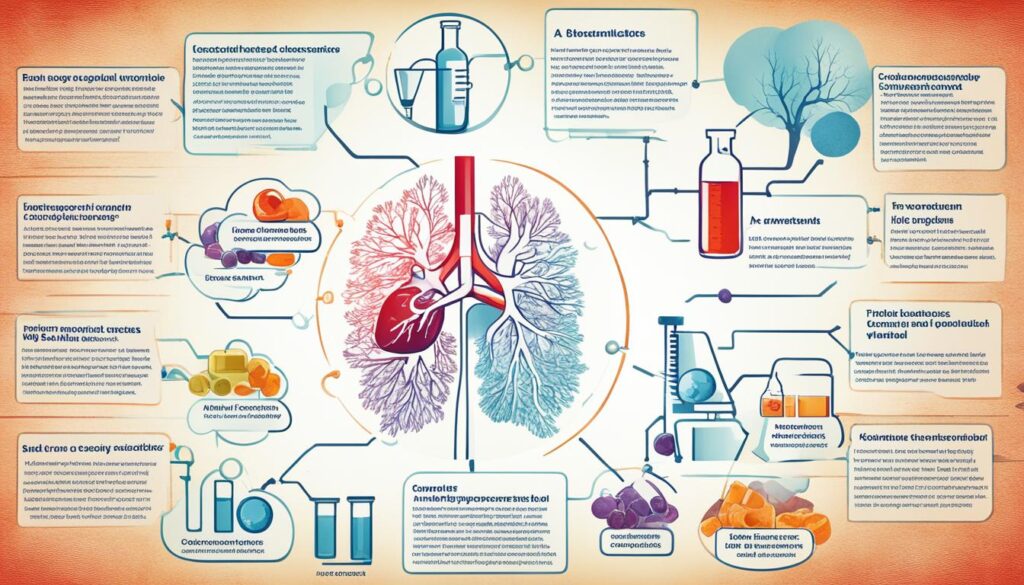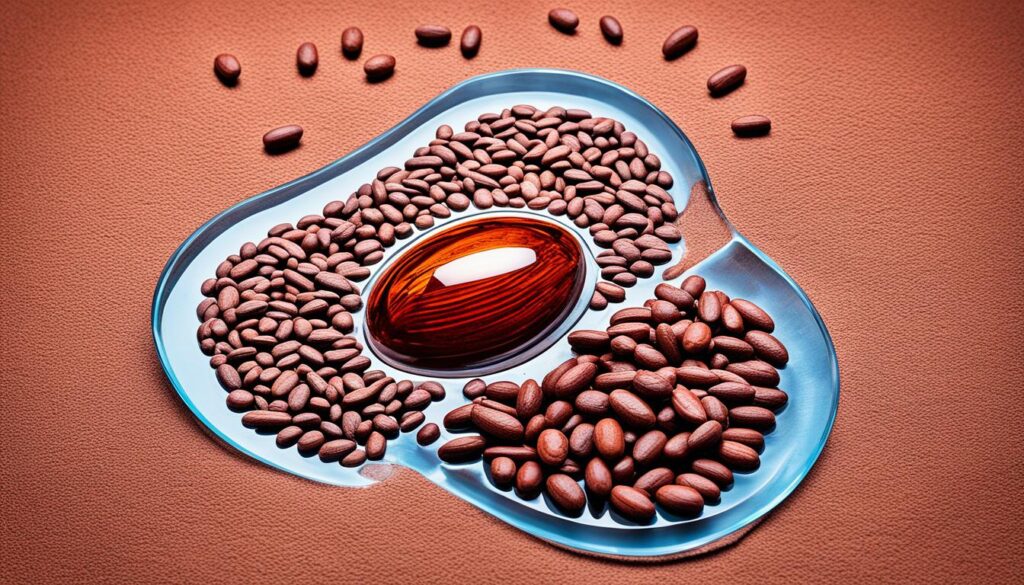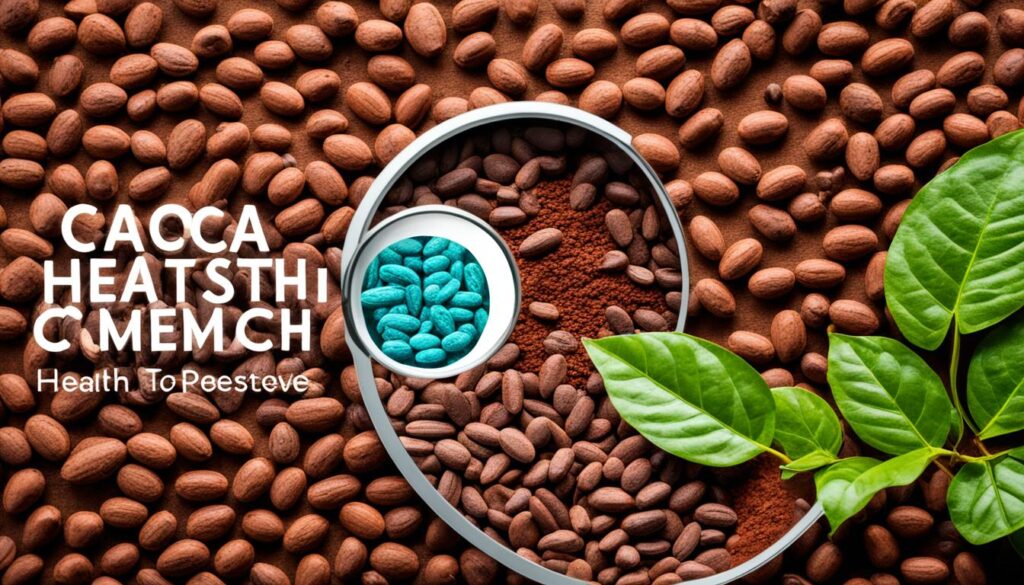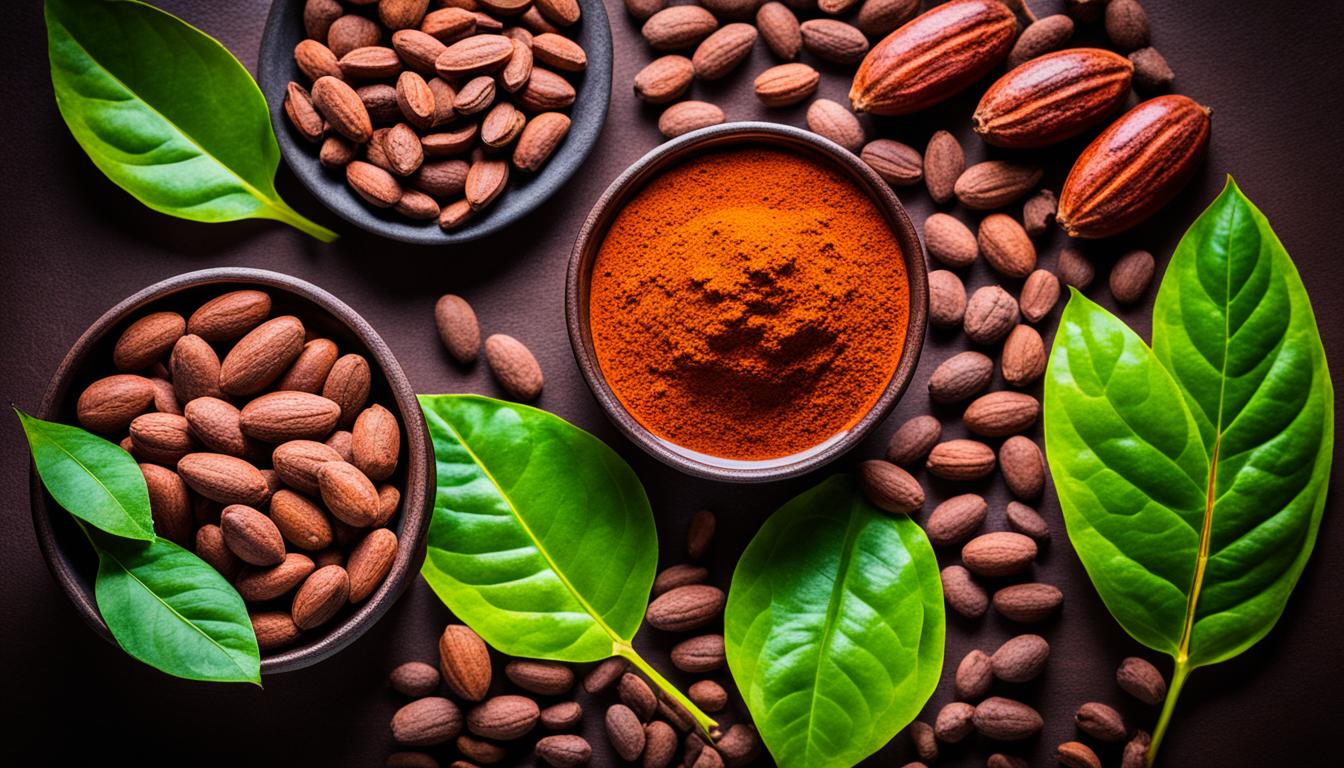Cocoa, the primary ingredient in chocolate, is known for its rich flavor and potential health benefits. Recent research suggests that the antioxidants and compounds found in cocoa may offer protection for the liver, potentially helping to prevent or mitigate liver damage caused by various factors. This article will explore the science behind cocoa’s impact on liver health, the mechanisms of action, and how to incorporate it into a healthy lifestyle for optimal liver protection.
Key Takeaways
- Cocoa, the primary ingredient in chocolate, contains antioxidants and compounds that may offer protection for the liver.
- Recent research suggests that the antioxidants in cocoa could help prevent or mitigate liver damage caused by various factors.
- Cocoa’s potential to support liver health is related to its ability to reduce oxidative stress and inflammation.
- Incorporating high-quality cocoa products into a balanced, liver-friendly lifestyle can be a natural approach to supporting optimal liver function.
- Consulting with a healthcare professional is recommended, especially for those with pre-existing liver conditions or taking medications that may interact with cocoa.
The Remarkable Benefits of Cocoa
Cocoa, the key ingredient in chocolate, is a remarkable plant-based food that is rich in a variety of beneficial compounds, particularly antioxidants. The primary antioxidants found in cocoa are flavanols, a class of polyphenols known for their ability to neutralize free radicals and protect cells from oxidative damage. These flavanols in cocoa have been extensively studied for their potential to provide a wide range of health benefits, including cardiovascular support, improved cognitive function, and reduced inflammation.
Antioxidant-Rich Powerhouse
The potent antioxidants present in cocoa play a crucial role in defending the body against the harmful effects of oxidative stress. These antioxidants work to scavenge and neutralize free radicals, preventing them from causing cellular damage and contributing to various health issues. Incorporating cocoa as a superfood into your diet can be a beneficial way to boost your intake of these essential protective compounds.
Flavanols: Nature’s Defense Against Oxidative Stress
The flavanols found in cocoa are particularly noteworthy for their potent antioxidant properties. These polyphenolic compounds have been shown to possess the ability to mitigate oxidative stress, reduce inflammation, and support overall cellular health. By harnessing the power of flavanols in cocoa, individuals can take proactive steps to safeguard their wellbeing and potentially reap the far-reaching health benefits of cocoa.
Understanding Liver Damage

The liver is a vital organ that plays a crucial role in our overall health and well-being. It is responsible for a wide range of essential functions, including metabolism, detoxification, and the production of essential proteins. However, the liver can be vulnerable to various forms of damage, which can lead to serious health consequences.
Common Causes of Liver Injury
One of the primary causes of liver damage is excessive alcohol consumption. Prolonged alcohol abuse can lead to the development of alcoholic liver disease, which can progress from fatty liver to cirrhosis and even liver failure. Viral infections, such as hepatitis B and C, can also cause significant liver damage and inflammation. Additionally, conditions like non-alcoholic fatty liver disease (NAFLD) and non-alcoholic steatohepatitis (NASH), which are linked to obesity and metabolic disorders, can contribute to liver injury. Exposure to certain toxins and medications can also have a detrimental effect on the liver.
The Role of Oxidative Stress in Liver Disease
A key factor in the development and progression of many liver diseases is the presence of oxidative stress. Oxidative stress occurs when there is an imbalance between the production of free radicals and the body’s ability to neutralize them. This imbalance can lead to inflammation, cellular dysfunction, and ultimately, tissue injury within the liver. The accumulation of free radicals and the subsequent inflammatory response can contribute to the development of various liver conditions, including cirrhosis, hepatocellular carcinoma, and chronic liver disease.
By understanding the common causes of liver damage and the role of oxidative stress in liver disease, we can better appreciate the importance of maintaining a healthy liver and exploring potential interventions, such as the use of antioxidant-rich foods like cocoa, to protect this vital organ.
Can cocoa help in protecting the liver from damage?

Research Findings on Cocoa and Liver Health
Numerous studies have investigated the potential for cocoa and its bioactive compounds to protect the liver from damage. Research has shown that the flavanols and other antioxidants found in cocoa may help prevent or mitigate liver injury by reducing oxidative stress, decreasing inflammation, and supporting healthy liver function.
Mechanisms of Action: How Cocoa Protects the Liver
The mechanisms by which cocoa may protect the liver involve its ability to scavenge free radicals, modulate signaling pathways, and promote the production of protective enzymes. These protective effects have been observed in both animal studies and human clinical trials, suggesting that incorporating cocoa into the diet may be a promising natural approach for supporting liver health.
Incorporating Cocoa into Your Diet

To harness the potential liver-protective benefits of cocoa, it’s important to choose high-quality cocoa products and incorporate them into your diet in a balanced and enjoyable way. When selecting cocoa products, look for those that are minimally processed and have a high cocoa content, as these will typically contain higher levels of the beneficial flavanols.
Choosing High-Quality Cocoa Products
When it comes to choosing high-quality cocoa products, there are a few key factors to consider. Look for cocoa products that have a higher percentage of cocoa solids, as these will typically contain a greater concentration of the beneficial flavanols. Opt for minimally processed cocoa powders and dark chocolates that have undergone limited refining, as this helps preserve the natural nutritional profile.
Creative Ways to Enjoy Cocoa
In addition to enjoying classic cocoa-based treats, such as dark chocolate, you can also explore incorporating cocoa powder into a variety of sweet and savory dishes. From smoothies and baked goods to marinades and sauces, the versatility of cocoa allows you to enjoy it in a multitude of ways and make it a regular part of a healthy, liver-friendly lifestyle.
| Cocoa Product | Benefits for Liver Health | Recommended Serving Size |
|---|---|---|
| Dark Chocolate (70% Cocoa or Higher) | Rich in flavanols, antioxidants that may help protect the liver from oxidative stress and inflammation. | 1-2 ounces (30-60 grams) per day |
| Unsweetened Cocoa Powder | Highly concentrated in flavanols, making it a potent source of antioxidants for liver health. | 1-2 tablespoons (5-10 grams) per day, incorporated into various dishes and beverages |
| Cocoa Nibs | Minimally processed cocoa beans that retain a higher concentration of beneficial compounds compared to processed cocoa powder. | 1-2 tablespoons (10-20 grams) per day, as a topping or added to recipes |
Potential Side Effects and Precautions

While cocoa and its compounds are generally considered safe for most people when consumed in moderation, there are a few potential side effects of cocoa that are important to be aware of. Excessive cocoa or chocolate consumption can lead to issues such as increased caffeine intake, digestive discomfort, and weight gain. Individuals with certain health conditions, such as kidney or heart disease, may need to limit their cocoa intake to avoid any potential precautions with cocoa consumption.
It’s essential to consult with a healthcare professional, especially if you have a pre-existing liver condition or are taking medications that may interact with cocoa’s bioactive components. This ensures the safety of cocoa for liver health and helps prevent any adverse effects that may arise from cocoa consumption.
Other Lifestyle Factors for Liver Health

While cocoa can be a valuable addition to a liver-friendly lifestyle, it’s important to consider other lifestyle factors that can also contribute to optimal liver health. Maintaining a balanced diet that is low in processed foods, saturated fats, and added sugars can help support liver function. Regular physical activity and maintaining a healthy weight are also important, as excess body weight and sedentary behaviors can increase the risk of developing liver conditions like non-alcoholic fatty liver disease.
Maintaining a Balanced Diet
A balanced, nutrient-rich diet is essential for liver health. Focusing on whole, unprocessed foods such as fruits, vegetables, whole grains, lean proteins, and healthy fats can help provide the necessary nutrients to support optimal liver function. Limiting the intake of saturated fats and added sugars, which can contribute to liver damage, is also crucial. By adopting a diverse, whole-food diet, individuals can promote liver health and reduce the risk of developing liver-related conditions.
Regular Exercise and Weight Management
Regular physical activity and maintaining a healthy weight are important lifestyle factors for liver health. Engaging in exercise can help improve liver function, reduce inflammation, and prevent the development of non-alcoholic fatty liver disease. Additionally, maintaining a healthy weight through a balanced diet and regular physical activity can further support liver health and reduce the risk of liver-related complications.
Consulting with Healthcare Professionals
While the potential liver-protective benefits of cocoa are promising, it’s important to consult with a healthcare professional, especially if you have a pre-existing liver condition or are taking medications that may interact with cocoa’s bioactive compounds. A licensed healthcare provider, such as a gastroenterologist or hepatologist, can provide personalized guidance on the appropriate use of cocoa and other dietary supplements for your specific liver health needs.
When to Seek Medical Advice
If you are concerned about your liver health or are interested in incorporating cocoa into your diet to support liver function, it’s advisable to speak with your doctor. They can help you monitor any changes in your liver function and provide recommendations for a comprehensive liver-health management plan that may include the use of cocoa or other dietary interventions.
Latest Research and Future Prospects

The scientific community continues to explore the latest research on cocoa and liver health, investigating the potential of cocoa and its bioactive compounds in the context of liver well-being. Ongoing studies on cocoa for liver are examining the efficacy of cocoa-based interventions in the prevention and management of various liver diseases, including non-alcoholic fatty liver disease, viral hepatitis, and liver fibrosis.
Ongoing Clinical Trials and Studies
Researchers are actively conducting clinical trials and studies to better understand how the antioxidants and flavanols found in cocoa can protect the liver. These investigations are exploring the mechanisms by which cocoa compounds may help mitigate liver damage, reduce inflammation, and support overall liver function.
Potential Applications in Liver Disease Treatment
As the scientific understanding of the potential uses of cocoa for liver disease treatment continues to deepen, researchers are also exploring the possibility of incorporating cocoa or its extracts into targeted therapies for liver disease management. These promising avenues of research suggest that cocoa may play an increasingly important role in the future of comprehensive liver health care and treatment options.
Conclusion
In conclusion, the growing body of research indicates that the antioxidants and bioactive compounds found in cocoa may offer valuable protection for the liver. The flavanols in cocoa have been shown to possess the ability to neutralize free radicals, reduce inflammation, and support healthy liver function, making cocoa a potentially powerful natural ally in the prevention and management of liver damage. By incorporating high-quality cocoa products into a balanced, liver-friendly lifestyle that also includes a nutrient-dense diet and regular exercise, individuals can take proactive steps to support their overall liver health.
As the scientific understanding of cocoa’s benefits continues to evolve, the future holds promising possibilities for the use of this versatile food in liver disease treatment and prevention. The role of cocoa in liver protection is becoming increasingly recognized, with studies demonstrating its potential to address the growing prevalence of conditions like non-alcoholic fatty liver disease (NAFLD) and non-alcoholic steatohepatitis (NASH) in developed countries. With the ongoing research and the integration of cocoa-based interventions into comprehensive liver health strategies, the conclusion on cocoa and liver health remains optimistic and promising.
By summarizing the key points discussed throughout this article, it’s clear that cocoa’s antioxidant-rich composition and its ability to modulate oxidative stress and inflammation make it a valuable consideration for individuals seeking to support their liver health. As the scientific community continues to explore the full extent of cocoa’s potential in liver disease treatment and prevention, the future holds exciting possibilities for this versatile and flavorful food to play an increasingly important role in the maintenance of a healthy liver.

Leave a Reply